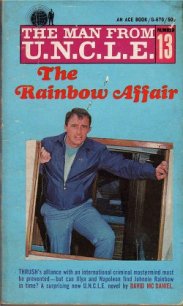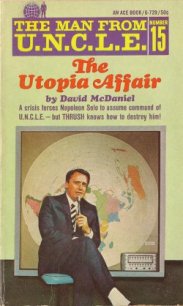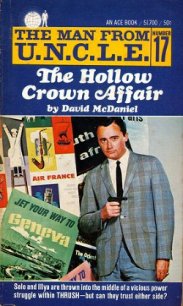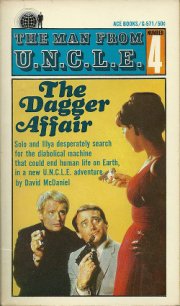The Vampire Affair - McDaniel David (читать книги без TXT) 📗
Hilda handed the envelope to Napoleon. "He is quite correct. There is no need to tempt fate. The inn is a quarter of a mile from here, but the street is not paved, and is unsuitable for the car. We will walk. Illya?"
The Russian agent looked at Hanevitch appraisingly. "Colonel, do you live here in this building?"
He took his time answering, as if he were analyzing the reasons behind the question. At length he said, "No, I live a few houses away."
"Will you be going home before midnight?"
The Colonel did not answer.
"Are you...cautious of the threat your village is under?"
Hanevitch rose to his feet and pulled in his stomach. "The government tells me the rumors of vampires are the superstitions of uneducated peasants. I am a sincere and dedicated Communist, and Marx said nothing about undead spirits. This outrage has a material cause, and my Tokarev can stop anything material and unarmored." He slapped his hand against the bulky Russian automatic strapped to his side.
Illya slowly and casually seated himself in a convenient chair. "Napoleon," he said without turning his head, "you and Hilda go ahead to the inn. I would like to continue conversing with Colonel Hanevitch for a while. After all, midnight should be no deterrent to two rational men."
Napoleon started to object, but Hilda poked him in the arm. "Come on, Napoleon," she said. "Am I the only one here sane enough to admit I am not rational? Or are you going to let me walk through the night alone?"
Solo opened and closed his mouth two or three times, and waved his hands to emphasize whatever he was trying to say. At last he heaved a deep sigh and said, "I think you're all crazy! Come on, Hilda; when Illya gets an idea like this in his head there's no reasoning with him."
As they closed the door behind them, they heard Hanevitch's voice saying, "Now, Mr. Kuryakin, what precisely was the cause of your leaving Russia?" Napoleon would have given a great deal to hear the answer, but Hilda had his sleeve and was stronger than she looked.
* * *
"What time is it, Napoleon?" asked Hilda, as she looked around the room where the U.N.C.L.E. agents would be staying.
"A few minutes short of eleven," he answered, checking his watch. "Why?"
"I just wondered," she said slowly. "It feels like midnight."
They had come into the room only a few minutes before, Hilda carrying one bag and Napoleon carrying two from the car, which had been left behind the Satul Contru. The room was on the third story of a large inn which must have dated back to a period of greater travel in the mountains. The ceiling was low and slanted, and the beds were large and soft, with heavy down comforters. A heavy silver pitcher of water stood in a matching bowl on the dresser, with a glass beside it: Gheorghe had been appraised of his guests' importance, and had brought out a family heirloom for their especial use. Hilda mentioned this to Napoleon, who made a note to be unusually grateful. There was also a modern table with two chairs in the center of the room, flimsy by comparison with the sturdily-built furnishings which matched the wood-raftered decor.
Napoleon didn't need to ask what she had meant by her remark that it felt like midnight. He had felt ill-at-ease since coming into the room, but he put it down to accumulated tiredness and the strangeness of the surroundings. He shook his head to clear it, and poured himself a glass of water.
He wandered around the room sipping at it, while Hilda flopped into one of chairs and watched. She tried to look relaxed, but her hand gripping the arm of the chair quivered with nervous tension. Napoleon felt it too—an unreasoning panic slowly growing inside him. He remembered a gas that caused blind fear like this in its victims, and went to the window. He threw the casement open and breathed deeply of the cold, sharp night air. It woke him up somewhat, but did nothing to ease his agitation.
He closed the window again and latched it securely, then strolled back towards Hilda. "Look," he said, as he set his empty glass down on the table. "It's late, and you've been under a terrific strain. I suggest strongly that you go back to your room, lock the door, and sleep till noon. You'll feel a lot better."
Somewhere a tall clock began chiming. "It's eleven o'clock," he continued, glancing at his watch. "We can discuss..."
Hilda held up her hand, listening. The clock chimed ten, eleven—and twelve. She looked up at him. "Did you set your watch ahead when you crossed the border?"
He thought. "Illya reminded me," he said, "but did I? I don't think I..."
Hilda's hand jumped for his wrist and grabbed it hard. She was staring past him, eyes wide with fear. Her mouth opened slowly, and she said in a strange whisper, "Napoleon—look at the glass on the table."
He turned, gently disengaging her hand, and looked. The glass he had just drunk from was crawling slowly across the top of the table. He stared at it in disbelief for a few seconds, and then reached out almost unwillingly as it approached the table's edge. He picked it up and looked at it, then set it down in the center of the table again. Immediately it began to move toward the edge. Not fast, but quite visibly. Hilda was shrinking back in her chair, staring with horrified fascination at it. Napoleon picked it up again, then quickly looked under the table. It was too light to have any kind of mechanism concealed inside it, practically cardboard and lath. He started to say, "There's a perfectly logical explanation..." But his voice failed him, and he swallowed hard.
The thought in his mind was Why is it moving?, but the only feeling in his stomach was primitive fear. He fought to control it. With a shaking hand he reached for the water pitcher. "Let's see if whatever it is can move half a pound of water," he said almost conversationally. Then Hilda screamed.
Napoleon could see the room behind him weirdly distorted in the bright surface of the pitcher—the light walls and the black curved rectangles of the windows. And there was something moving outside the windows. Something so distorted by the curvature of the metal he couldn't tell what it was.
He whirled on his toes and cocked his arm. In a fraction of a second he saw a black shape standing just outside the window, and his mind photographed it: almost as tall as one window and with a wingspread as wide as both, and with a face almost human but unbelievably baleful glaring into the bright light of the room. Then Napoleon hurled the pitcher with all his strength and the glass exploded outward in a shattering burst of sparkling shards.
A moment later there was the sound of a shot from below. Napoleon opened his eyes again, and realized he had closed them just as he had thrown the pitcher. He ran to the window, and looked down twenty-five feet to the muddy street below. He looked up into the darkness. There was no sound, and only the feel of a vagrant breeze stroked his cheek with a clammy finger.
He looked down again, and saw Illya standing, legs apart and braced, gun in hand, looking up at him.
"What did you see?" Napoleon asked.
"I don't know," countered Illya. "What do you think you saw?"
Napoleon shook his head. "I don't want to say right out loud because I didn't get more than a glimpse of it. I couldn't identify it in a lineup." But as he spoke the picture came to him, as sharp and clear as a studio photograph, of a face in the midst of the floating, flapping blackness, just outside a third-story window with no balcony....




